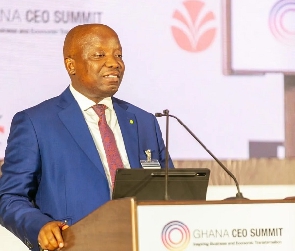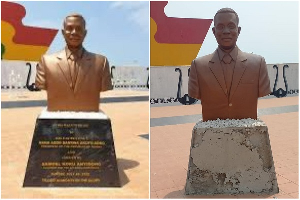A knowledge partner of the 7th CEO Summit, Deloitte Ghana, has urged government to leverage the International Monetary Fund programme to develop a long-term growth agenda for the country.
This, it believes, is crucial in an effort to wean the economy off significant donor dependence in the medium- to long-term. “Use the IMF programme as a platform to develop a long-term growth agenda rather than a short-term. This will help to ‘wean’ our economy from significant donor dependency in the medium- to long-term and enable us to realise the ‘Ghana Beyond Aid’ agenda,” Country Managing Partner of Deloitte Ghana, Daniel Kwadwo Owusu, has said.
He also added that with the IMF programme now onboard, government should use the mid-year budget to review some of the revenue measures introduced in the 2023 budget – including some of the new taxes which have potential to adversely affect productive sectors of the economy.
Mr. Owusu further suggested reviewing government expenditure on certain programmes, “particularly recurrent expenditure, and re-allocate resources to priority industries such as the industrial and agriculture sector in order to drive growth and create employment”.
He made these remarks at the 7th Ghana CEO Summit and Expo held in Accra on the theme ‘Economic sovereignty, sustainable corporate governance, digital industrial transformation: new paths for growth and prosperity a private-public sector CEO dialogue & learning’.
Speaking on the theme and proposing pragmatic measures that can fuel national development, he recommended effective monitoring of strategic policies for economic sovereignty.
“Ghana has shown excellence as a country in developing policies and programmes aimed at transforming the economy. The challenge has been monitoring these programmes to ensure they achieve their desired outcomes. We should enhance the Monitoring and Evaluation (M&E) units of all Ministries, Departments and Agencies (MDAs), and provide the needed resources to ensure all programmes are tracked to agreed targets or benchmarks.
“We should embark on a Comprehensive Value for Money review of all major government projects before contracts are awarded. This will ensure the country gets appropriate returns on these projects,” he said.
On leveraging information technology as a tool to extensively formalise the economy, he tasked government to accelerate synchronisation of the national identification card (ID) and business registration of individuals and companies. This, he said, will assist in roping all economically active non-taxpaying individuals and businesses into the tax net, thereby improving internal revenue mobilisation.
Given the economic uncertainty, he advised businesses to embrace good corporate governance as a strategic pillar for mitigating operational risks and driving sustainability.
Also, “MMDAs should collaborate with foreign agencies and departments to create a database whereby Ghanaians living abroad can support projects in their hometowns and villages.”
For his part, Professor Ayaz A. Shafi advised the CEOs to revise their way of operations and how they deal with their teams; saying they should move from commanding to collaboration, from controlling to evaluation, and also focus on impact to achieve more results at the workplace.
Senior Regional Manager-International Finance Corporation (IFC), Kyle Kelhofer, encouraged supporting import substitution, value addition and diversification – all of which are essential for a resilient economy.
The summit called on government to work together with relevant stakeholders – including the Chief Executives (CEO) Network of Ghana, to restore the country’s economy and strive to achieve sustainable economic sovereignty.
Business News of Wednesday, 24 May 2023
Source: thebftonline.com

















